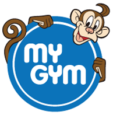When To Start Sports Activities For Toddlers?
Everyone understands that two and three year olds are far too young to figure out the rules and other intricacies of formal sports by themselves. Apart from this, their physical growth and skills are also limited. On top of all these constraints, they are already deriving big benefits from unstructured play at home.
So why start them on preschool sports activities at this point in time? Won’t it be burdening young children with more than they can handle? No, not really.
Benefits of sports for preschoolers that lead up to traditional organized game rules when they are at school, can be customized to suit their age. In this way, most sports activities and games can be tailormade to be a part and parcel of preschool learning activities.
Starting organized sports in early childhood
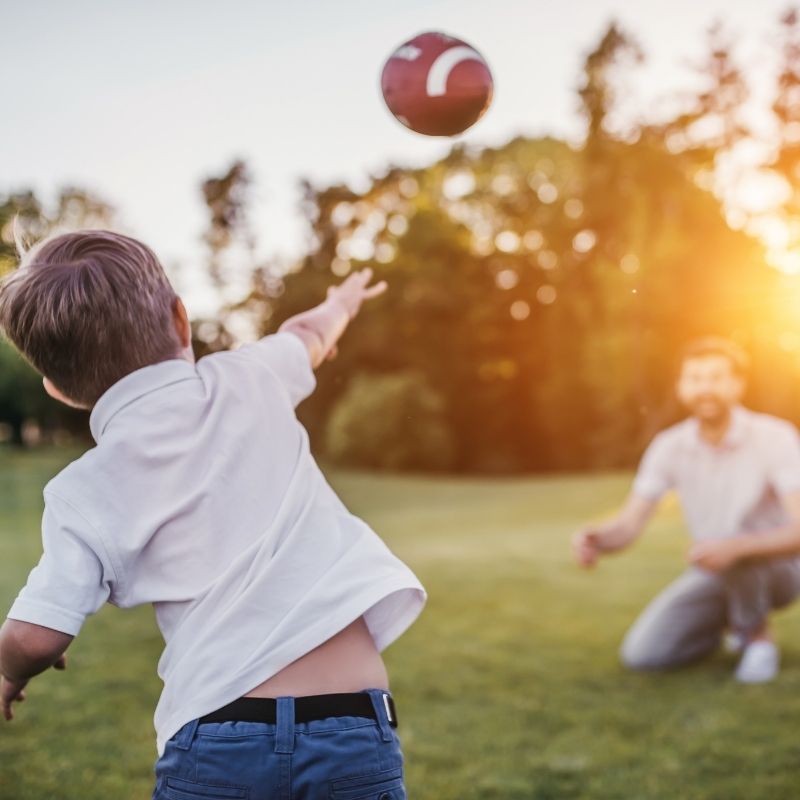
It is not necessary to teach preschoolers all the rules of organized sports such as basketball, football, hockey, and cricket, among others. Instead, the diluted versions of these games can be played, to teach the essentials of the ‘big-kid’ games.
These modified versions of popular sports and games will be great primers for later when young children work their way up and are ready to join school-age teams or play for after-school clubs. They will be ready to dribble a ball, how to hit a ball with a bat or stick and run between wickets.
Picking up social competence skills
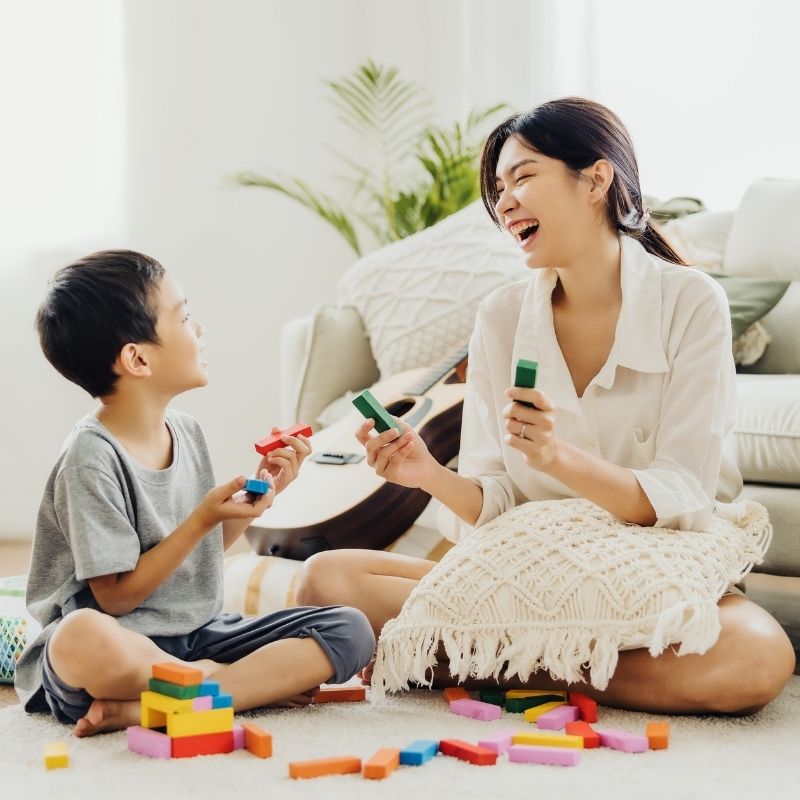
These ‘big-kids’ sports and games for preschoolers can also introduce young children to team etiquette and what a healthy competition can be. Bear in mind, that there is no “out” in any of the games meant for these youngsters. Instead, the focus is on learning how to work together to solve problems, how to be polite when they are competitive, and how to get along with other team members.
Also remember that it is okay if a game doesn’t go as expected, or when young children fall, or trip, or don’t see a ball coming their way, simply because, it’s just a game. Where mistakes can be made alongside other children of the same age and everyone is working on developing at the same pace.
The overall aim is to get the message across that sports can help develop healthy, functioning bodies for all-around growth and development for young children.
Finally, developing healthy gross and fine motor skills, as well as exercise for working out can be counted as a well enough reason for participating in sports and games. And don’t forget, vigorous physical movement can help with improving attention spans. Young children learn skills in a more specific and repetitive way through organized sports. Helping little minds realize that it is worth the effort to keep working at them.
Sports ideas for home
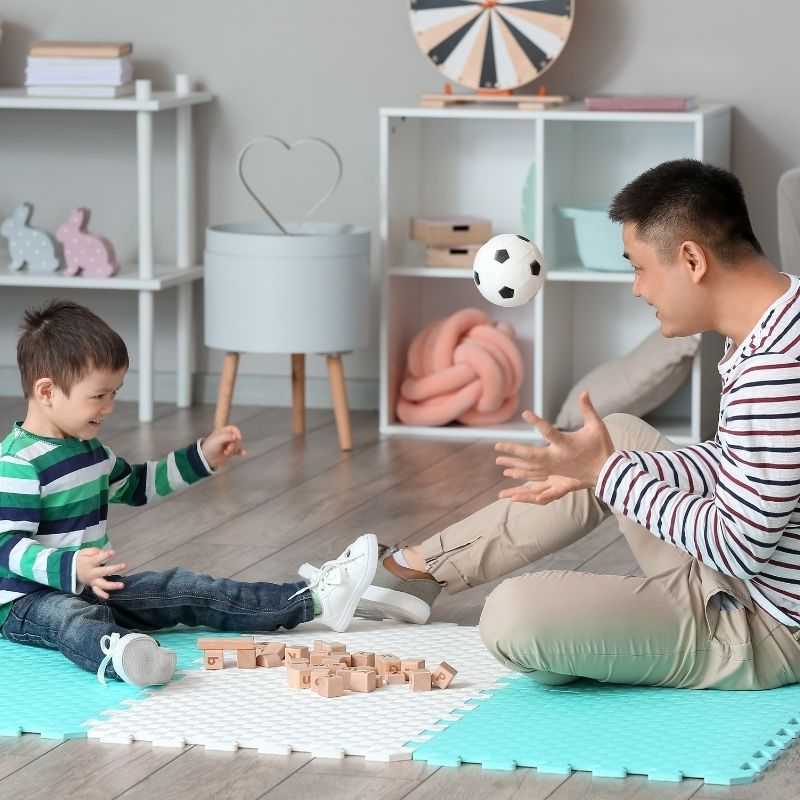
A home is a great place for parents and their toddlers to start and do research into ‘what’s most suitable for the child’ and for ‘how long they can play’.
Hula hoops are a good way to mark ‘bases’ that young children can run to when a ball is rolled to them, kicking a balloon or hitting a softball into a goal post with a hockey stick.
Practice hand-eye coordination with your child by slowly rolling or throwing a ball below the waist level, or you can get your child to catch the ball by bouncing a ball against a wall.
Tossing a ball into a wastepaper basket is an effective way for a toddler to understand the basics of dunking a basketball. Or hitting a golf ball on a stand with a bat and running to a base can help introduce your toddler to baseball. Actually, it will be good to cheer every time your child makes it to the base.
How about foosball? It is just about right for the preschool age group to learn about basic football. It involves kicking foam balls and passing them to another player and also teaches basic cooperation and team skills or how to stand in line.
Make up your own games
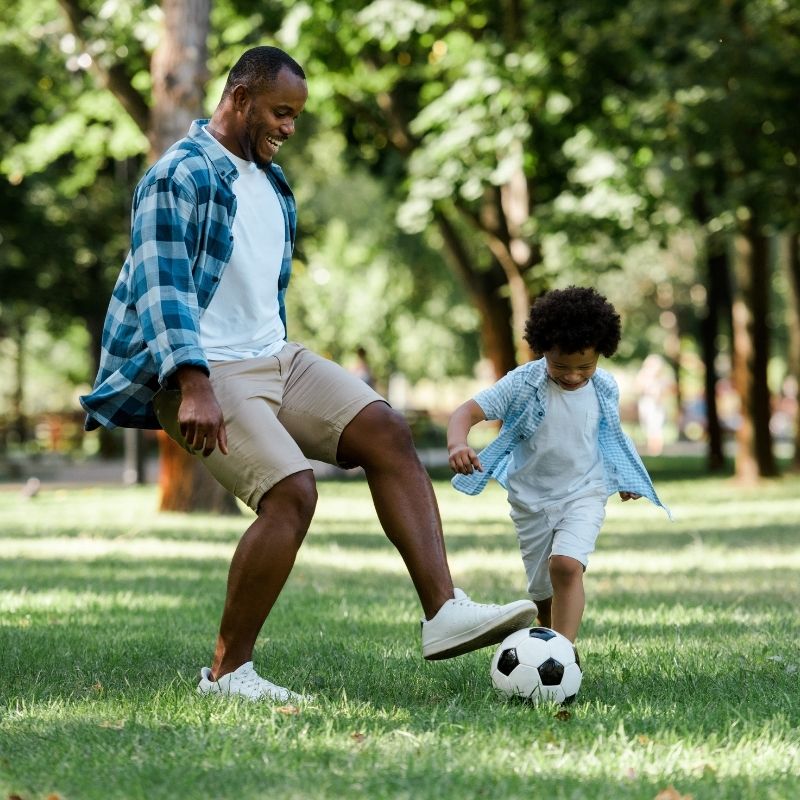
Another way to teach the concept of organized sports is by making your child understand that some games have rules and she has to follow and listen to her coach to be able to play them well.
You can come up with very simple games. For example, ‘go-go-stop’, where young children run in circles until the music stops, or you say, “stop!” Anyone who still moves might still be able to play but as a chaser. Playing the ever popular “Tag” is also a good game for teaching rules.
One of the things you really need to make sure when you get young children to play organized sports is never playing with a hardball. Always throw and catch at very low heights, and never bounce a ball too far away for them. Use balloons or soft, easy to roll balls for hockey.
Please ensure all the items you use are safe for young children to play with.
Organized sports should be fun
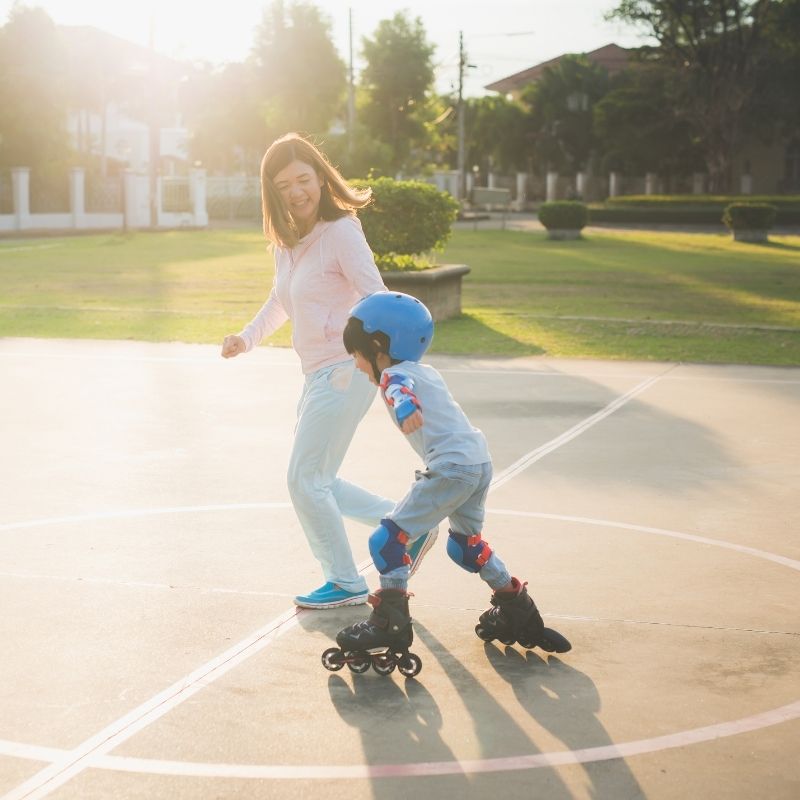
Remember, when playing organized sports with a young child, the idea is not to win, nor to perfect their play. It is just to learn to play well. Parents have to keep in mind that young children simply do not as yet have the skillset to do advanced moves.
So, avoid throwing the ball very high or too far, or kicking a ball at a certain angle. The environment for playing sports with a child should always be positive, and fun, fun, fun. If a child feels left out or overwhelmed, you need to address it right away. Involve the team to help out, too.
Sports is a very cultural activity. Older children may be obsessed with football which always have a big impact on very young children. So, use it to your advantage, by asking the skilled children to help coach or teach. Always avoid letting their advanced abilities interfere with having fun.
Always be helpful
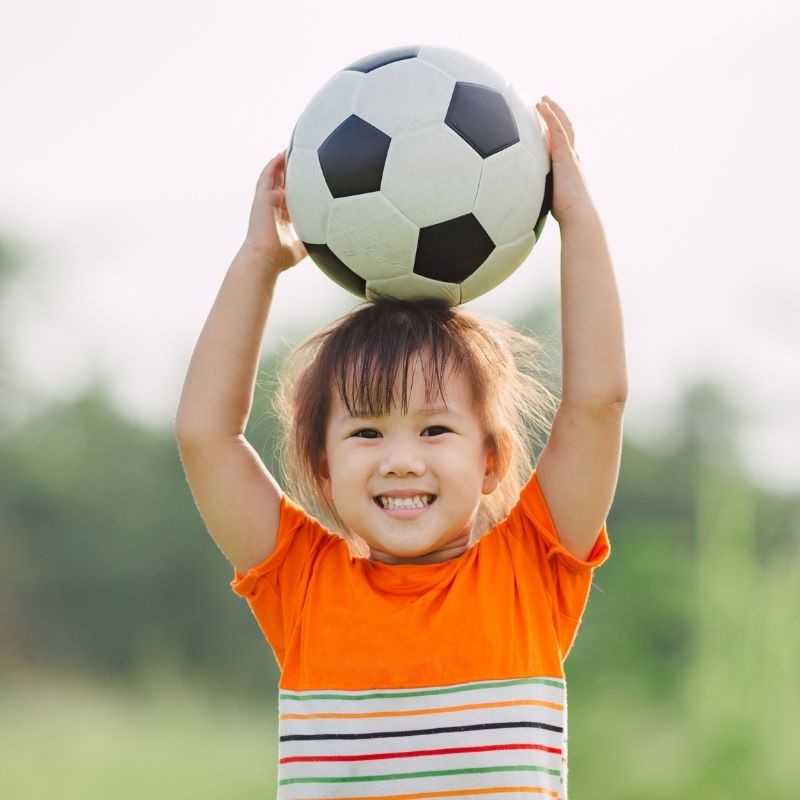
Most preschoolers find running and playing actively as natural as breathing. They have boundless energy and this needs to be channelled in the right way to provide fun and enjoyment. Always helping them develop an understanding of how their bodies work and move.
Teach a child to do some simple warm-up activities like wriggling fingers, making a fist, shaking hands and feet; rotating shoulders, stretching their arms high above their heads and bending low, and clapping their hands.
Easy warm up exercises can include activities like carrying a beanbag on your head for a distance. Picking up a hoop and climbing through it or jumping over a length of string, stepping along a chalk line and finishing up the routine by rolling a ball into a box!
Ask children to design their own obstacle course. Where will they start, what will they start with and how will the course end? Give them an outline map of the area they can use, and help them to draw a plan of how the course will look. Try it out.
Engage in a conversation involving the differences between games being played. Ask questions such as, do you use a bat or a racquet to play rugby? Bring together a set of different balls and compare them to each other and identify the sport or the game they are used to playing.
Or better still, discuss the changes that happen to their bodies when they run for long. How do their legs feel when jumping? What do they need to keep healthy and strong?
When taking part in sports and games, young children are exposed to the ideas of taking turn-taking and teamwork during ‘sports’ activities allow children to learn the value of friendship and partnership, and help develop good relationships.
About My Gym
Sports and games for toddlers and young children can significantly improve their mental and physical health. When taught and played correctly, sports can be the safest activities to engage in. Depending on what might be best for your child, My Gym offers evaluations and performances as a way of tracking and motivating the progress of its young pupils.
Visit My Gym at your convenience. Choose a day when you will be relatively free and come over with your child in tow. Your child could be an infant (as young as 6 months), toddler or a preschooler, age is not a bar. We will work in partnership with you and strive to provide the best learning experiences. Laying a firm foundation for your child’s personal, academic and future growth.
Please note: My Gym classrooms are thoroughly sanitized every day — the tables, the chairs, the children’s activity stations and everything else the child might touch is made safe and clean. Please wear a mask, wash hands frequently, and practice social distancing.
Frequently Asked Questions
How do you introduce activities to preschoolers?
Fundamental sports and games that form a part of preschool learning activities include dribbling a ball, passing objects, hitting a softball, balancing, tumbling, and sprinting. Introduce your toddler to sports during early childhood and inspire them to participate in regular physical activities by adding a creative twist that helps enhance their motor, cognitive, social, and creative abilities to offer your kid an excellent preschool learning experience.
How sports help in the physical development of a child?
When it comes to the benefits of sports for preschoolers, children learn sportsmanship, improve gross and fine motor skills, and develop a longer attention span. Play-based activities create a joyful learning environment for children and encourage them to be naturally active. It also allows children to engage with their peers and improve their social skills. These exercises also make toddlers more aware of their physical and emotional responses.
How To Get Kids Interested In Sports?
Kids tend to engage easily in both structured and unstructured play since they are naturally thrilled to play games, interact with family and friends, and learn new things every day. Since play-based learning is both enjoyable and stimulating, sports for preschoolers are an important aspect of early childhood education. Participating with toddlers and helping them grasp the rules of a game as a parent or educator is one of the most effective methods to get toddlers interested in play-based preschool learning activities.
When is my child ready for sports?
As early as infancy, children are ready for play-based learning. Toddlers aged three months to three years often engage in unstructured play at home as well, but children aged four to eight years or older enjoy participating in structured play. Preschool enrichment activities for kids are aimed at introducing two-year-old toddlers to sports in their early childhood.
What is the importance of organizing sports and other activities in early childhood?
Among the key competencies that children develop during their early childhood development are gross and fine motor skills, creative expression, recitation, and singing. Sports, arts, and group discussions are a few preschool enrichment activities for kids that encourage holistic development and give them a headstart in their academic journey. These exercises also improve a child’s overall health and well-being.

